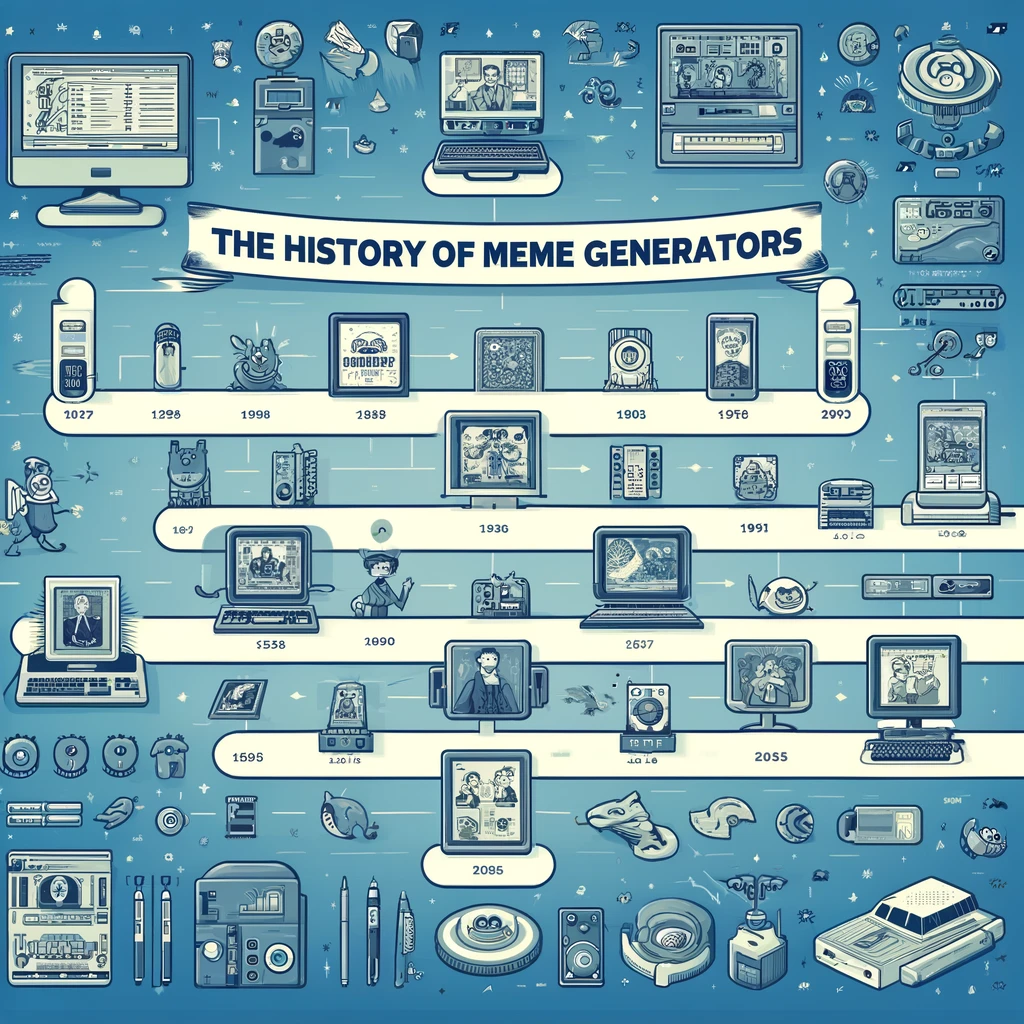The History of Meme Generators: Tools that Shaped Meme Culture

Memes have become an integral part of internet culture, serving as a medium for humor, social commentary, and viral trends. The evolution of meme culture has been significantly influenced by the development of meme generators—tools that simplify the creation of memes, allowing anyone to participate in this digital phenomenon. This article explores the history of meme generators, examining how they have shaped and democratized meme culture from their inception to the present day.
Early Days of Meme Creation
In the early days of the internet, creating memes required a degree of technical skill and access to graphic design software. Memes were often created using programs like Microsoft Paint or Adobe Photoshop, which, while powerful, were not accessible to everyone.
-
Manual Creation with Graphic Software
- Overview: Early meme creators relied on graphic design software to manually create and edit images, adding text and other elements to produce memes.
- Example: Classic memes like "Dancing Baby" and "Hamster Dance" were created using early graphic design tools and shared via email and rudimentary web pages.
-
Challenges and Limitations
- Overview: The complexity of graphic design software and the need for technical skills limited meme creation to a relatively small group of internet users.
- Example: Creating a meme from scratch required time, effort, and a certain level of expertise, making meme creation less spontaneous and widespread.
The Rise of Online Meme Generators
The introduction of online meme generators revolutionized meme culture by making it easy for anyone to create and share memes. These tools provided pre-made templates and simple interfaces, democratizing meme creation.
-
Early Meme Generator Websites
- Overview: The first meme generator websites emerged in the late 2000s, offering users the ability to create memes quickly and easily by choosing from a selection of popular templates.
- Example: MemeGenerator.net, launched in 2009, became one of the most popular early meme generators, offering templates for memes like "Advice Animals" and "Rage Comics."
-
Impact on Meme Culture
- Overview: Meme generators lowered the barrier to entry for meme creation, leading to an explosion of user-generated content and the proliferation of memes across social media.
- Example: The widespread use of meme generators contributed to the viral spread of memes like "Success Kid," "Bad Luck Brian," and "Overly Attached Girlfriend."
Evolution of Meme Generators
As meme culture evolved, so too did meme generators. New features and functionalities were introduced, allowing for greater creativity and customization.
-
Advanced Customization Options
- Overview: Modern meme generators offer advanced customization options, including the ability to upload custom images, adjust text size and color, and add multiple text boxes.
- Example: Imgflip’s meme generator allows users to create highly customized memes by providing a wide range of editing tools and a large library of templates.
-
Integration with Social Media
- Overview: Many meme generators now integrate directly with social media platforms, making it easy to share memes instantly with a broader audience.
- Example: Websites like Kapwing and Canva not only offer meme creation tools but also include direct sharing options to platforms like Facebook, Twitter, and Instagram.
-
Mobile Apps and Accessibility
- Overview: The rise of mobile apps has made meme creation even more accessible, allowing users to create and share memes on-the-go.
- Example: Apps like Meme Creator and Mematic provide easy-to-use interfaces for creating memes on smartphones, further democratizing the process.
The Role of AI and Automation in Meme Creation
Artificial intelligence and automation have introduced new possibilities for meme creation, allowing for more sophisticated and personalized content.
-
AI-Driven Meme Generators
- Overview: AI-driven meme generators use machine learning algorithms to create memes based on user input and existing meme formats.
- Example: Imgflip’s AI Meme Generator can generate new memes by analyzing popular templates and user preferences, producing content that often mimics human humor.
-
Automated Meme Templates
- Overview: Automated tools can generate meme templates based on trending topics and current events, keeping meme culture relevant and up-to-date.
- Example: Platforms like DeepAI offer automated meme generation services that create memes from headlines or user-provided text, allowing for rapid and timely meme creation.
The Impact of Meme Generators on Digital Culture
Meme generators have had a profound impact on digital culture, shaping the way we communicate and interact online.
-
Democratization of Content Creation
- Overview: By lowering the barrier to entry, meme generators have empowered a broader range of individuals to participate in meme culture, fostering creativity and inclusivity.
- Example: The ability to easily create and share memes has given rise to diverse voices and perspectives within meme culture, enriching the digital landscape.
-
Acceleration of Viral Trends
- Overview: Meme generators have accelerated the spread of viral trends, allowing memes to be created and disseminated quickly in response to current events.
- Example: Memes related to major news events or cultural phenomena can go viral within hours, driven by the rapid production capabilities of meme generators.
-
Cultural Influence and Social Commentary
- Overview: Memes have become a powerful tool for social commentary, using humor and satire to address political, social, and cultural issues.
- Example: Political memes, such as those created during election cycles, can shape public discourse and influence opinions, highlighting the role of memes in contemporary society.
The history of meme generators is a testament to the evolution of digital culture and the power of technology to democratize creative expression. From the early days of manual meme creation to the sophisticated AI-driven tools of today, meme generators have transformed the way we create, share, and engage with memes. As technology continues to advance, meme generators will undoubtedly play an increasingly important role in shaping the future of digital communication and culture. Understanding the history and impact of these tools offers valuable insights into the dynamics of internet culture and the ways in which technology influences our collective creativity and expression.